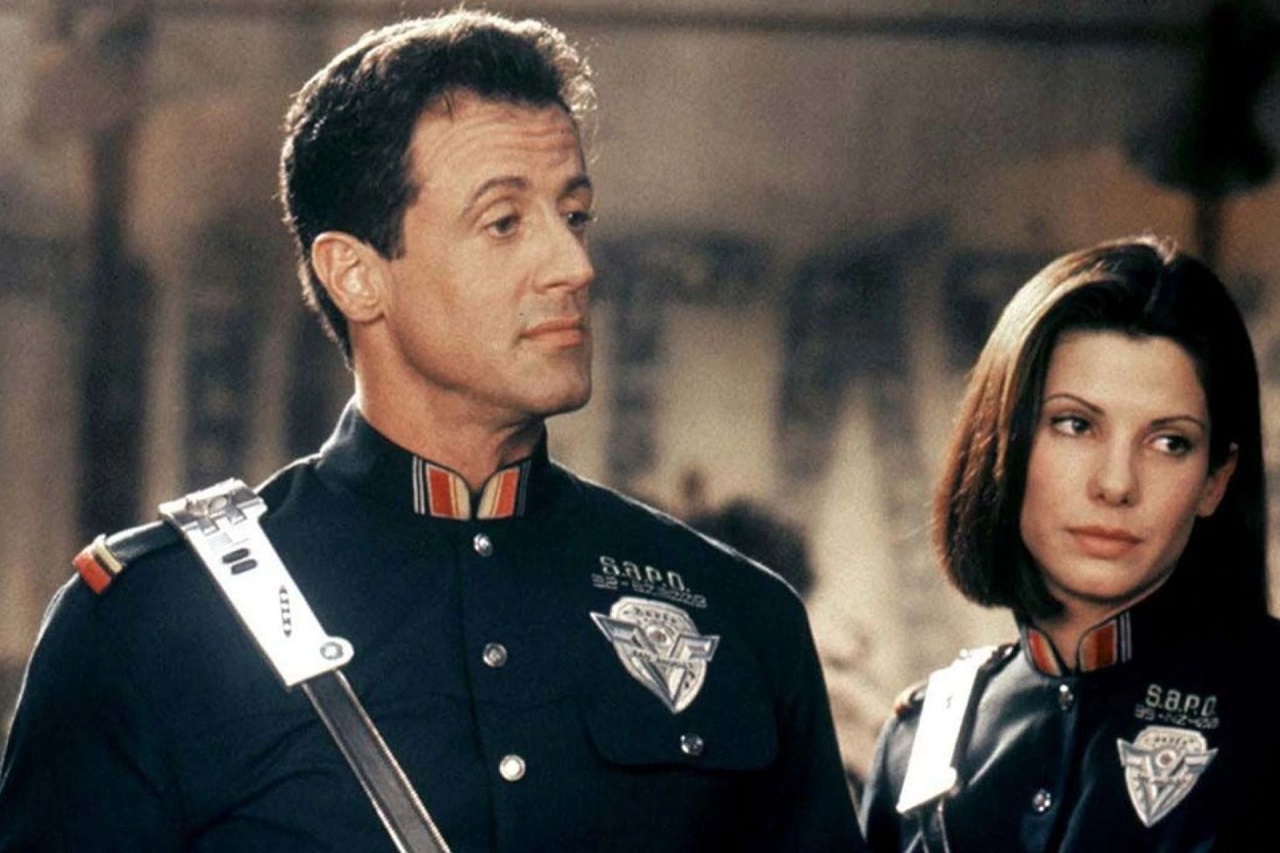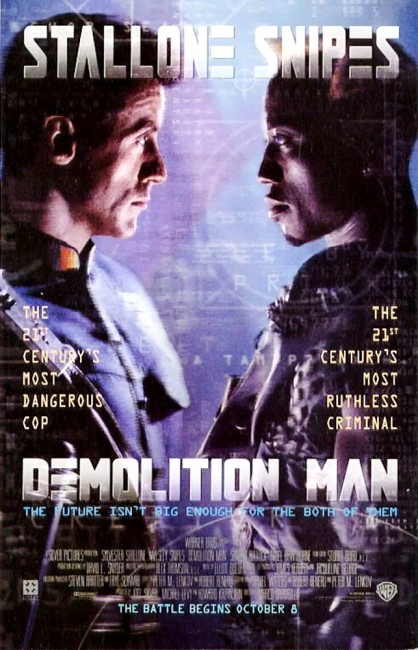USA. 1993.
Crew
Director – Marco Brambilla, Screenplay – Peter M. Lenkov, Robert Reneau & Daniel Walters, Story – Lenkov & Reneau, Producers – Howard Kazanjian, Michael Levy & Joel Silver, Photography – Alex Thomson, Music – Elliot Goldenthal, Visual Effects Supervisors – Michael J. McAlister & Kimberly M. Nelson, Animation/Digital Effects – Available Light Inc, Special Effects Supervisor – Joe D. Ramsay, Body Effects – Alec Gillis & Tom Woodruff Jr, Production Design – David L. Snyder. Production Company – Silver Pictures/Warner Brothers.
Cast
Sylvester Stallone (Sergeant John Spartan), Sandra Bullock (Lenina Huxley), Wesley Snipes (Simon Phoenix), Nigel Hawthorne (Dr Raymond Cocteau), Bob Gunton (Captain George Earle), Dennis Leary (Edgar Friendly), Benjamin Bratt (Alfredo Garcia), Glenn Shadix (Associate Bob)
Plot
Los Angeles, 1996. Police sergeant John Spartan single-handedly apprehends criminal Simon Phoenix as Phoenix holes up in a factory with seventy hostages. However, Phoenix has rigged the factory and causes Spartan to inadvertently blow the hostages up. For neglect of duty, Spartan is sentenced, along with Phoenix, to seventy years in cryo-sleep during which time his subconscious will be reprogrammed via subliminal suggestion. In the year 2032, Phoenix is thawed out for a parole hearing and makes an armed escape into the future society of San Angeles. In San Angeles, the brilliant Dr Raymond Cocteau has restructured society – everybody is now nice to one another, while smoking, meat eating and swearing have been outlawed. Unused to violence, the law enforcement of this future has no idea how to handle Phoenix and the only choice is to thaw out Spartan to apprehend him. However, the individualistic Spartan finds himself at odds with this future.
With the name of Sylvester Stallone attached to an action vehicle, one has rarely come to expect anything other than mindless violence and red-blooded politics that approach the extremes of reactionary libertarianism. Demolition Man is an action film and its politics are arguably reactionary and libertarian but the surprise for a Sylvester Stallone film is that it emerges as an action film with rare intelligence and a considerable sense of humour.
Demolition Man offers a wittily satiric vision of the future – one where current fads for Political Correctness have created a society that is so nice that it is dystopian. The satire runs wall-to-wall – radio stations and piano bars plays jingles from 20th Century advertising commercials; fast food joints have become the restaurants of the future serving up junk food as though it were gourmet dinners; and perhaps in response to Arnie’s digs at him in Twins (1988) and Last Action Hero (1993), Sylvester Stallone throws in a sly joke about how the immigration laws were changed to allow Arnold Schwarzenegger (who at this point had yet to become the Governor of California) to become President (an idea that was being treated seriously a few years later).
Perhaps one of the funniest moments is Sylvester Stallone’s meeting with revolutionary leader Dennis Leary where Leary suddenly turns around and reveals in perfect straight-face that what he is fighting for is the right to eat red meat, smoke, read Playboy and run naked through the streets if he wants – exactly the opposite of what a revolutionary is supposed to be in favour of rebelling .

There are a number of in-references to the classic dystopian book Brave New World (1932) about a perfected society where sex and reproduction had been eliminated. These include a heroine named Lenina Huxley, which is a concatenation of the book’s heroine Lenina Crowne and author Aldous Huxley, while the hero John Spartan has a number of similarities to the book’s character of John the Savage, a character from outside the Utopia whose ‘primitive’ naturalised ways both upset and become an objection of fascination.
Demolition Man came at a point where Sylvester Stallone was trying to gain back charge of his career and turn away from a string of box-office flops. It even shows Stallone indulging in a little Political Correctness himself and repudiating the very violence his film plays on – in one interesting (if not particularly convincing) scene, he tries to delineate a dividing line between violence that is acceptable for enforcing the law against people who are conducting armed robbery for profit and terrorism, and its use against people who are conducting armed robbery to steal the basic necessities of life – “Sometimes it’s good to hurt people – but not people who are stealing food”.
For the first time in a long while, Sylvester Stallone seems at remarkable ease in the role. He even engages in self-parody, getting an enormous amount of mileage out of jokes about having been hypno-programmed to knit and not being able to work out how the toilets of the future work. He gets fine support from a pre-superstardom Sandra Bullock who gives a sparkling performance of naively happy ebullience.

Where Demolition Man is uninteresting – oddly enough considering that such was its selling point – is in the action scenes, which are routine. Considering his double-billing opposite Sylvester Stallone, Wesley Snipes is not well used – he yells his performance in and seems only another street punk that the classic Stallone would have blown away without a second thought. Certainly, Wesley Snipes never provides the degree of villainy that the film needs to turn him into an adequate nemesis. As an actor, Snipes never manages to suggest he is particularly well intellectually endowed. Here he is meant to be the villain, but is so dull that even Sandra Bullock’s heroine manages to steal the film out from under him.
Demolition Man was not a large success, as has been the case with many of Sylvester Stallone’s films of the 1990s and 2000s. Italian director Marco Brambilla next went onto make the flop Alicia Silverstone kidnapping comedy Excess Baggage (1997) and then returned to genre material with the tv mini-series Dinotopia (2002). He now works as a video/CGI installation artist.
Trailer here

